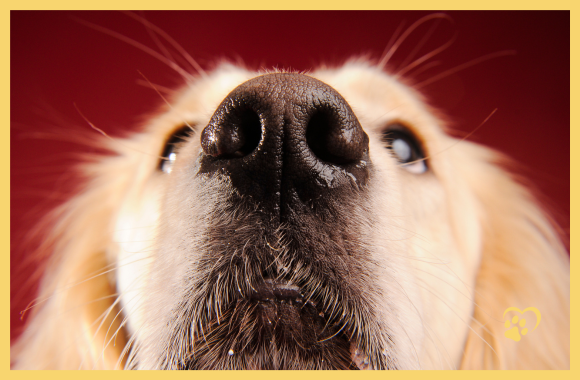Every dog owner knows the feeling: a changed look, less lively behavior and the worry grows. Is my dog sick? You are not alone with these questions.
We give you a clear overview of the most common signs and their significance. So you are always well informed and can react in time. Early detection of disease symptoms can be crucial to avoid serious complications and promote a speedy recovery.
General signs of disease in the dog
It is important for every dog owner to know the signs of a possible disease in their pet. Early detection helps to provide the dog with the best possible care and treatment.
Behavioral changes
You yourself know your dog best. If you notice that he behaves differently than usual, it may be a sign that something is wrong. Maybe he is more lethargic, shows less interest in playing or eats less. Sudden or unexplained changes in behavior should not be ignored. In such cases, it is advisable to consult your veterinarian to make sure that your dog is healthy and has no serious health problems. It is always better to be safe than sorry and take your dog's health seriously.
Loss of appetite or altered eating behavior
If you notice that your dog suddenly has no appetite or his eating behavior changes drastically, this is a warning signal. Loss of appetite can be a sign of various illnesses or malaise. Always pay attention to your dog's behavior and see a veterinarian if symptoms persist. Every dog has their own preferences when it comes to eating, but sudden and unexplained changes can be a warning sign. YOU should always pay attention to how much and how often your dog eats, and if in doubt, act in time.
Noticeable sluggishness or increased fatigue
Every dog has a day when he is less active or wants to rest. However, if you notice that your dog is noticeably sluggish over several days or sleeps more than usual, this may be a sign of a health problem. A healthy dog is curious and active. If your four-legged friend suddenly shortens or even avoids his walks, you should take notice. He could be in pain or uncomfortable. A visit to the vet can provide clarity and ensure your dog gets the treatment he needs. Always pay attention to your dog's behavior and have an expert evaluate any changes. YOU know your dog best and know best if something is wrong.

Specific symptoms
Coughing, sneezing and shortness of breath
If you notice that your dog has been coughing or sneezing more frequently than usual lately, this could be due to a number of reasons. One of the more harmless causes could be a simple cold that causes temporary discomfort, just like in humans. However, it could also be an allergy triggered by pollen, dust or other allergens in the environment. However, in some cases, these symptoms may also indicate a more serious condition such as bronchitis, which causes an inflammatory response in the dog's airways. It is important not to ignore these symptoms. If the symptoms persist or worsen, you should see a veterinarian immediately to ensure that your four-legged friend receives the best possible care and treatment.
Diarrhea or vomiting
Occasional vomiting or sporadic diarrhea can be caused by a simple stomach upset, such as when your dog has eaten something indigestible. It is not uncommon for dogs to exhibit such symptoms occasionally. However, if these symptoms become more frequent, worsen, or persist over a long period of time, it may be a warning sign of more serious problems. It could be a bacterial or viral infection, a food allergy, or a deeper health problem. It is important that in such situations you do not hesitate to have your dog examined by a veterinarian immediately to determine the exact cause and take appropriate action.
Lameness or difficulty walking
Has your dog been having trouble walking or moving lately? Perhaps you've noticed that he's not as agile as he used to be or that he limps after playing. Signs of lameness or hesitation when getting up can be worrisome. These symptoms may indicate a recent injury such as a strain or bruise. In other cases, it may be arthritis, an inflammatory condition that is most common in older dogs. There are many other bone and joint problems that can cause such symptoms. It is important to give your dog adequate rest at such times and avoid sudden or strenuous movements. Observe him carefully and if symptoms persist, consult a veterinarian for an accurate diagnosis and the best treatment recommendations.
Frequent scratching or biting of certain areas of the body
If you notice that your dog has been scratching, biting or licking certain areas of his body constantly lately, he may be suffering from skin problems. Persistent scratching and biting is often a sign that something is wrong. It may be a simple rash caused by an allergy or irritation. In other cases, parasites such as fleas, ticks or mites could be the culprit causing the uncomfortable itching and discomfort. There is also the possibility of a bacterial or fungal infection of the skin, which can cause redness, swelling or even suppuration. To ensure that your dog receives the best possible care and treatment, it is advisable to see a veterinarian. The veterinarian can take skin samples or run tests to determine the exact cause of the problem. Once the cause is found, the veterinarian can recommend an appropriate treatment, whether it is a medication, a special shampoo, or other therapy that will provide your dog with relief.
Noticeable changes in the eyes or ears
Your dog's eyes and ears are sensitive organs that require special attention. If you notice changes such as redness, persistent discharge, swelling or even discoloration, this could be a warning sign. Such symptoms can indicate a variety of problems. For the eyes, for example, it could be conjunctivitis, corneal injury or even glaucoma. For the ears, ear infections, foreign bodies or ear mites may be the cause. It is important to understand that these changes can not only be uncomfortable for your four-legged friend, but in some cases can lead to more serious conditions if left untreated. Therefore, these signs should never be ignored or taken lightly. To ensure that your dog receives the proper care and treatment, it is highly recommended that you see a veterinarian immediately if you notice any of these signs. An early visit to the veterinarian can help identify the problem early and initiate appropriate treatment before complications arise.

When to consult a veterinarian
Distinction between transient and serious symptoms
It's not uncommon for dogs to have occasional minor aches and pains. A simple upset stomach or a slight limp after extensive play may be temporary problems. However, if you notice your dog's discomfort persisting or worsening over several days, it could be a sign of a more serious problem. It's always better to be safe than sorry and ask an expert for advice.
The importance of regular veterinary examinations
Even if your dog appears to be healthy, regular veterinary checkups are important. These checkups help detect potential health problems early and treat them appropriately. Remember that dogs don't always show when they are in pain or uncomfortable. Regular checkups will give you the reassurance you need that your four-legged friend is doing well, and can also help prevent major health problems and associated high veterinary costs in the future.
Pay attention to your dog's signals and seek professional advice when in doubt.
Prevention and general health tips
A healthy dog is a happy dog. But what does that actually mean and how can you ensure that your four-legged friend stays healthy? Here are some tips on preventive health care and maintenance.
The right diet
Diet plays an important role in the health of your dog. Make sure you feed high quality food that contains all the necessary nutrients. Pay attention to your dog's weight and consult your veterinarian if you are not sure what amount or type of food is best for your dog.
Movement and play
Exercise keeps not only the body but also the mind of your dog fit. Regular walks and games strengthen the bond between you and your pet and help to release excess energy. It also promotes joint health and prevents weight problems.
Vaccinations
Vaccinations protect your dog from many dangerous diseases. The vaccination schedule should always be discussed with your veterinarian so that your dog receives the best possible protection. Some vaccinations are required every year, others only every few years. Always keep the vaccination record up to date. Don't hesitate to consult your veterinarian if you have any questions or concerns. It's always better to be safe than sorry when it comes to your pet's health.
It is about the well-being of your dog
Your dog's well-being should always come first. As you may have noticed, small changes in your dog's behavior or physical condition are often a sign that something is wrong. Always be alert and watch for these signs. A happy and healthy dog is not only more active, but also brings joy to your life.
It is important to educate and inform yourself. The well-being of your dog depends greatly on your knowledge and attention. The more you know, the better you can take care of your four-legged friend.
Read also:

